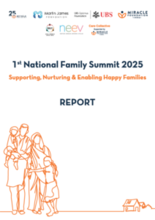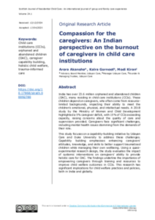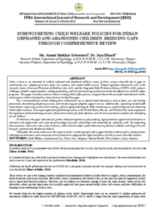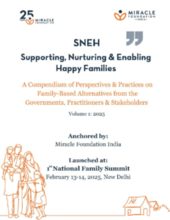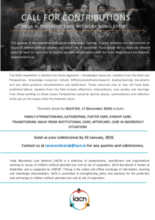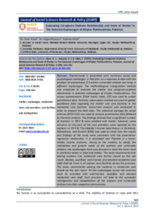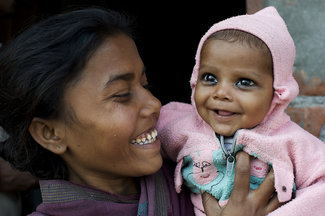

Displaying 41 - 50 of 746
The National Summit on “Reimagining the Care System for Children in India” was held on the 30th of March, 2025, in New Delhi.
India’s 23.6 million orphaned and abandoned children often rely on overburdened caregivers in child care institutions, where staff shortages and high demand affect quality of care. This study evaluates a capability-building program by Udayan Care and Duke University, showing how strengthening caregivers’ skills, knowledge, and wellbeing can improve outcomes for vulnerable children.
This paper critically reviews India’s child welfare policies, highlighting how gaps in implementation, funding, and monitoring continue to leave millions of orphaned and abandoned children vulnerable despite existing legal frameworks. Drawing on international best practices, it proposes a shift toward family-based care, strengthened mental health and social work systems, technology-enabled monitoring, and greater child participation to build a more inclusive, child-centred welfare system.
The SNEH: Supporting Nurturing Enabling Happy Families compendium was developed by Miracle Foundation India as part of the first National Family Summit to showcase progress, insights, and best practices in advancing family-based care and child protection reforms in India. It builds on lessons from its “Leadership Dialogue” series and collaborations with government, civil society, and care-experienced youth.
This study aimed to highlight the challenges faced by care leavers due to the absence of or inadequate aftercare support during the transition, which increases care leavers’ vulnerabilities to homelessness, unemployment, substance misuse and ruptured social relationships.
This article explores the complex landscape of alternative care for orphaned and vulnerable children in Afghanistan against the backdrop of prolonged conflict, political turmoil and socio-economic challenges.
India Alternative Care Network (IACN) is calling for contributions to the 17th edition of IACN Quarterly. If you are a practitioner, academician, researcher, civil society organization, or a funder and wish to share learning, information, interventions, case studies, perspectives, and knowledge resources on children without parental care or at risk of separation, email your submission to iacnsecretariat@iacn.in on or before January 10, 2025.
Adoptees return to find a society that no longer recognises them, legally or socially
This study evaluates the shelter conditions and caregiver–orphan relationships in orphanages in Khyber Pakhtunkhwa, Pakistan, using both quantitative and qualitative methods. Findings indicate that while most orphans are satisfied with basic shelter, their relational and developmental needs are often unmet, highlighting the need for well-trained residential care staff and the recommendation that institutional care be used only as a last resort to support successful reintegration into communities.
Foreign money fuels fake orphanages in Nepal where children are taken from their parents and marketed as victims. But the fightback is on

